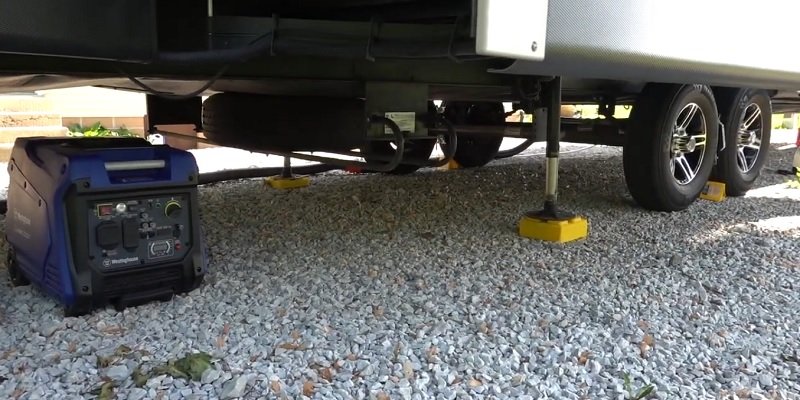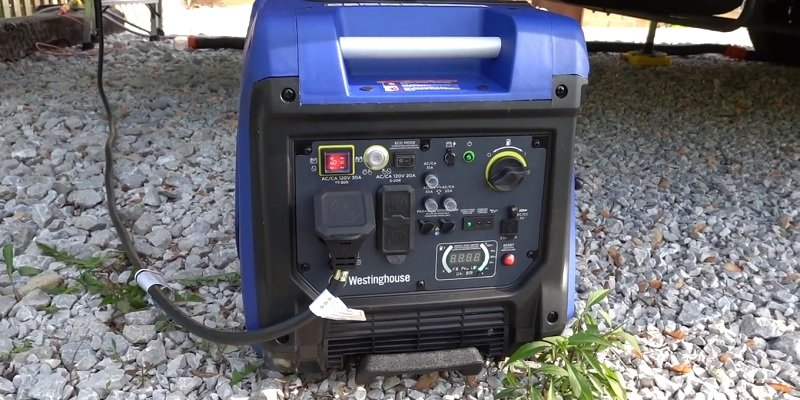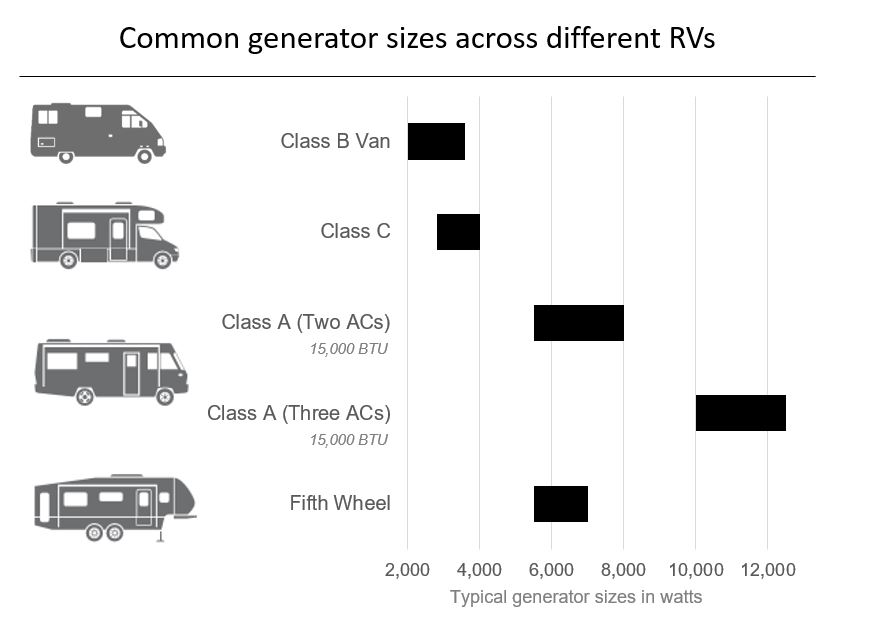Disclosure: This post contains affiliate links and I will be compensated if you make a purchase after clicking through my links. Learn More
For an RV with two AC units, a 5,500 to 7,000-watt generator is typically recommended. This range ensures both units run efficiently.
Choosing the right generator size for your RV is crucial. A generator that is too small won’t power your air conditioning units effectively. A generator with a capacity between 5,500 and 7,000 watts can handle two AC units and other essential appliances.
Ensuring your generator is powerful enough will provide a comfortable and hassle-free camping experience. It’s important to consider the starting and running watts required by your AC units. Investing in a generator within this wattage range can help avoid power shortages and maintain a stable energy supply.

Choosing The Right Generator
Selecting the right generator for your RV with two AC units is crucial. This ensures comfort and efficiency during your travels. You need to consider several factors to make the best choice.
Factors To Consider
When choosing a generator, you must think about different factors. These factors help you select the most suitable generator for your RV.
- Power output: Your generator needs to provide enough power.
- Fuel type: Choose between gasoline, diesel, or propane.
- Noise level: A quieter generator is better for peaceful trips.
- Portability: Ensure the generator is easy to move and store.
Power Requirements
Understanding the power requirements of your RV’s AC units is essential. Each AC unit typically needs around 2000 to 3000 watts to start.
| Appliance | Starting Watts | Running Watts |
|---|---|---|
| 1 AC Unit | 2000-3000W | 1500-2000W |
| 2 AC Units | 4000-6000W | 3000-4000W |
Consider other appliances you might use. Add up their power needs to ensure your generator can handle the load.
Here is a list of common RV appliances and their power needs:
- Microwave: 800-1200W
- Refrigerator: 600-800W
- TV: 150-400W
- Lights: 50-100W each
By calculating total power needs, you can choose a generator that meets your requirements. This helps ensure a smooth and enjoyable RV experience.
Understanding Power Needs
Choosing the right generator for your RV with two AC units is essential. You need to understand your RV’s power needs. This ensures you have enough power for all your devices.
Wattage Calculation
Calculate the wattage needed for your RV’s appliances. Each device has a specific power requirement.
- Check the labels on your devices.
- Add up all the wattages.
- Ensure the total does not exceed the generator’s capacity.
For two AC units, you need to consider their wattage. AC units have high power demands. Check the manufacturer’s details for accurate numbers.
Running Vs Starting Watts
Running watts and starting watts are different. Running watts are the continuous power needed. Starting watts are higher and needed to start the device.
| Device | Running Watts | Starting Watts |
|---|---|---|
| AC Unit 1 | 1,500W | 2,000W |
| AC Unit 2 | 1,500W | 2,000W |
Add the starting watts of both AC units. This ensures your generator can handle the initial power surge.
For example, if both AC units need 2,000 starting watts, your generator must handle 4,000 watts.
Also, factor in other devices. The fridge, microwave, and lights also need power.
By understanding running and starting watts, you can choose the right generator. It ensures you have enough power for all your needs.
Types Of Generators
Choosing the right generator for your RV with 2 AC units is crucial. You need to understand the different types of generators available. This helps you make an informed decision that ensures comfort and efficiency during your travels.

Portable Generators
Portable generators are a popular choice for RV owners. They are easy to move and set up. These generators come in various sizes and power outputs. You can find them in both gasoline and diesel options. Here are some features of portable generators:
- Mobility: Easy to transport and store.
- Versatility: Can be used for multiple purposes.
- Cost-effective: Generally cheaper than other types.
- Noise level: Can be loud, so check the decibel rating.
When choosing a portable generator, ensure it has enough power to run both AC units. Typically, you need at least a 4,000-watt generator for two AC units.
Inverter Generators
Inverter generators are known for their efficiency and quiet operation. They are more advanced than traditional portable generators. These generators provide clean and stable power, which is essential for sensitive electronics. Key features of inverter generators include:
- Efficiency: Uses fuel more efficiently.
- Quiet operation: Produces less noise.
- Clean power: Safe for electronics and appliances.
- Parallel capability: Can connect two units for more power.
For an RV with 2 AC units, an inverter generator with at least 3,000 watts is recommended. If needed, you can use two smaller inverter generators in parallel to meet the power requirement.
Both types of generators have their advantages. Your choice depends on your specific needs and preferences. Consider factors like power output, noise level, and fuel efficiency when making your decision.
Fuel Types
Choosing the right generator for your RV with 2 AC units is crucial. One key factor is the fuel type. Different fuels have various pros and cons. Below, we explore the two main fuel types: gasoline and propane.
Gasoline Generators
Gasoline generators are popular among RV owners. They are easy to find and use. Here are some benefits:
- High Availability: Gasoline is available at most gas stations.
- Easy Refueling: Refueling a gasoline generator is simple.
- Cost-Effective: Gasoline generators are usually cheaper to buy.
However, gasoline generators have some drawbacks. They can be noisy and may require frequent maintenance. Also, gasoline has a shorter shelf life.
Propane Generators
Propane generators are an excellent alternative. They are efficient and environmentally friendly. Here are their benefits:
- Long Shelf Life: Propane doesn’t degrade over time.
- Cleaner Burning: Propane produces fewer emissions.
- Quiet Operation: Propane generators run more quietly.
But, propane generators can be more expensive. Propane may not be as readily available as gasoline. You also need space for propane tanks.
| Feature | Gasoline Generators | Propane Generators |
|---|---|---|
| Availability | High | Moderate |
| Refueling | Easy | Requires extra space |
| Cost | Lower | Higher |
| Maintenance | Frequent | Less frequent |
| Noise | Louder | Quieter |
| Environmental Impact | Higher | Lower |
Noise Levels
Understanding the noise levels of a generator is crucial. Especially for an RV with 2 AC units, noise can impact your comfort. Let’s delve into how you can manage noise efficiently.
Decibel Ratings
Generators produce noise measured in decibels (dB). A lower dB means a quieter generator. For RV use, aim for a generator with a rating below 60 dB.
| Decibel Level | Noise Level |
|---|---|
| 40-50 dB | Very Quiet (like a library) |
| 50-60 dB | Quiet (like a conversation) |
| 60-70 dB | Moderate (like a busy street) |
Noise Reduction Tips
- Install Sound Barriers: Use walls or panels to block noise.
- Use Rubber Feet: Reduce vibrations by adding rubber feet to your generator.
- Maintain Distance: Place the generator far from your RV.
- Choose Inverter Generators: They are quieter than conventional generators.
Implement these tips to enjoy a quieter RV experience.
Read More: How to Make Your Generator Quiet
Installation Tips
Installing a generator for an RV with 2 AC units can be challenging. Follow these tips to ensure a smooth and safe installation process.
Proper Ventilation
Ventilation is crucial for generator performance and safety. Ensure your generator has enough space around it.
- Keep at least 3 feet of clearance on all sides.
- Install venting systems to direct fumes outside.
- Avoid placing the generator near windows or doors.
Safety Precautions
Safety should be your top priority during installation. Follow these safety tips to protect yourself and your RV.
- Read the manufacturer’s manual before starting.
- Wear protective gear, such as gloves and goggles.
- Use a transfer switch to avoid electrical hazards.
Install carbon monoxide detectors inside the RV. Test them regularly to ensure they are working.
Keep a fire extinguisher nearby. Ensure it is rated for electrical fires.
Maintenance
Maintaining your RV generator is crucial for its longevity and performance. Proper upkeep ensures reliable power for your RV’s two AC units. Regular maintenance can prevent unexpected breakdowns and costly repairs.
Regular Checks
Perform regular checks to keep your generator running smoothly. Inspect the oil level before each trip. Low oil can damage the engine.
- Oil Change: Change the oil every 100 hours of operation.
- Air Filter: Clean or replace the air filter every 200 hours.
- Spark Plugs: Replace spark plugs every 300 hours.
Check the fuel system for leaks or damage. Ensure the battery is fully charged and terminals are clean.
Read More: How to Test a Generator?
Common Issues
Generators can face common issues if not maintained properly. Recognize these problems early to avoid major repairs.
| Issue | Cause | Solution |
|---|---|---|
| Overheating | Dirty air filter | Clean or replace air filter |
| Low Power Output | Clogged fuel line | Inspect and clean fuel line |
| Starting Problems | Weak battery | Charge or replace battery |
Regular maintenance prevents these common issues. Keep a maintenance log to track service intervals.
Remember, a well-maintained generator ensures your RV’s two AC units run efficiently. Happy travels!
Top Generator Models
Finding the right generator for an RV with 2 AC units can be challenging. You need a powerful and reliable generator to keep your RV comfortable. Here are some of the top generator models that can handle the load.
Popular Brands
Several brands are known for their high-quality generators. These brands provide reliable power for RVs with multiple AC units.
- Honda – Known for quiet and efficient generators.
- Yamaha – Offers durable and long-lasting generators.
- Champion – Popular for their powerful and affordable options.
- Westinghouse – Renowned for their reliable and user-friendly models.
Key Features
Consider these key features when choosing a generator for your RV:
| Feature | Description |
|---|---|
| Power Output | The generator should have at least 3000-4000 watts. |
| Noise Level | Choose a generator with a noise level under 60 decibels. |
| Fuel Type | Generators run on gasoline, propane, or dual fuel. |
| Portability | Ensure the generator is easy to move and store. |
| Runtime | Look for a generator with a long runtime for convenience. |
Choosing the right generator ensures you enjoy a comfortable RV experience. Select a model that meets your power needs and preferences.

Frequently Asked Questions
What Size Generator For Rv With 2 Ac Units?
A 4,000 to 5,500-watt generator is recommended for RVs with 2 AC units.
Can A 3,000-watt Generator Run 2 Ac Units?
No, a 3,000-watt generator typically cannot support 2 AC units simultaneously.
How To Calculate Generator Size For Rv Ac?
Add the wattage of both AC units, then include other appliances’ wattage.
What Type Of Generator Is Best For Rv Ac?
Inverter generators are preferred for their efficiency and quiet operation.
Final Words
Choosing the right generator for an RV with two AC units is crucial. Ensure it meets your power needs. Consider fuel efficiency and noise levels. A 5,000 to 7,000-watt generator is typically sufficient. Proper research guarantees comfort on your travels.
Enjoy a seamless RV experience with the right generator.








